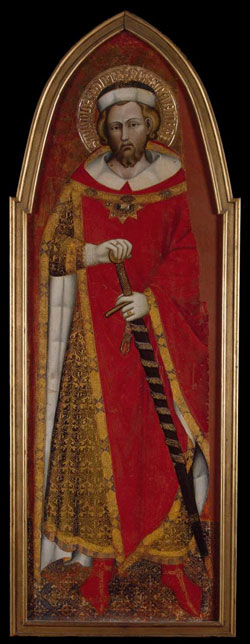
Pope from 230-235 who holds the distinction of being the first pontiff to abdicate. Perhaps a Roman by birth, he was elected to succeed St. Urban I and devoted much of his reign to upholding the condemnation of the heretical aspects of Origenism and struggled against the schismatic movement which supported the antipope Hippolytus. In 235, Pontian was arrested by Roman officials at the instigation of the persecution of the Church by Emperor Maximinus I Thrax. With Hippolytus, Pontian was exiled to the infamous mines of Sardinia and, in order to make certain that the Church was not deprived of its leadership, Pontian stepped down, the first pope ever to do so. He and Hippolytus both died on Sardinia. Their remains were returned to Rome under Pope St. Fabian.
For others called Pontianus, see Pontianus. For others called Pontian, see Pontian.Pope Pontian (Latin: Pontianus; died October 235) was the bishop of Rome from 21 July 230 to 28 September 235. In 235, during the persecution of Christians in the reign of the Emperor Maximinus Thrax, Pontian was arrested and sent to the island of Sardinia. He resigned to make the election of a new pope possible. When Pontian resigned on 28 September 235, he was the first pope to do so. It allowed an orderly transition in the Church of Rome and so ended a schism that had existed in the Church for eighteen years.
Life
A little more is known of Pontian than his predecessors, apparently from a lost papal chronicle that was available to the compiler of the Liberian Catalogue of the bishops of Rome, written in the 4th century. The Liber Pontificalis states that he was a Roman citizen and that his father's name was Calpurnius. Early Church historian Eusebius wrote that his pontificate lasted six years.
Pontian's pontificate was initially relatively peaceful under the reign of the tolerant Emperor Severus Alexander. He presided over the Roman synod which approved Origen's expulsion and deposition by Pope Demetrius I of Alexandria in 230 or 231. According to Eusebius, the next emperor, Maximinus, overturned his predecessor's policy of tolerance towards Christianity. Both Pope Pontian and the Antipope Hippolytus of Rome were arrested and exiled to labor in the mines of Sardinia, generally regarded as a death sentence.
In light of his sentence, Pontian resigned, the first pope to do so, so as to allow an orderly transition in the Church of Rome, on 28 September 235. This date was recorded in the Liberian Catalogue and is notable for being the first full date of a papal reign given by contemporaries. This action ended a schism that had existed in the Church for eighteen years. Pontian was beaten to death with sticks. Neither Hippolytus nor Pontian survived, possibly reconciling with one another there or in Rome before their deaths. Pontian died in October 235.
Veneration
Pope Fabian had the bodies of both Pontian and Hippolytus brought back to Rome in 236 or 237, and the former buried in the papal crypt in the Catacomb of Callixtus on the Appian Way. The slab covering his tomb was discovered in 1909. On it is inscribed in Greek: Ποντιανός Επίσκ (Pontianus Episk; in English Pontianus Bish). The inscription "Μάρτυρ", "MARTUR" had been added in another hand.
In the Eastern Orthodox Church and the General Roman Calendar of 1969, Pontian and Hippolytus are commemorated jointly on 13 August. In those Catholic communities which use a historical calendar such as the General Roman Calendar of 1960, Pontian's feast day is celebrated on 19 November.





